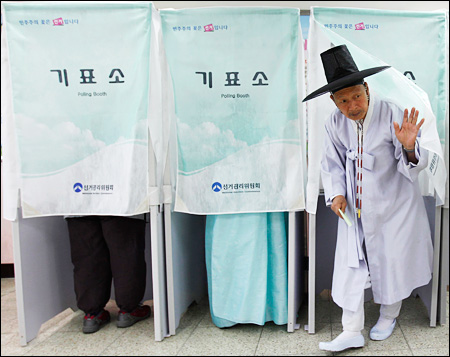Change or status quo?

Yoon Bok-yeob, a village schoolmaster who leads a Confucian lifestyle, exits a booth to cast his ballot at a polling station Wednesday in Nonsan, South Chungcheong Province, about 190 kilometers south of Seoul.
Interpretation differs by partisan line
Millions of voters cast their ballots in the 2012 National Assembly elections, Wednesday. It was a collective effort to shape the future of the nation.
A series of pre-election surveys conducted by media outlets have predicted the result to be on a knife edge and add to an already deafening buildup for the presidential poll in December.
This is the first time in two decades that the parliamentary and presidential elections have fallen in the same year and this has certainly showed in the level of intensity displayed by competing political parties, hungry media wolves and voters who seemed more opinionated than ever.
It seems that the stakes have never been higher for politicians and taxpayers as the country appears to be facing a perfect storm of civil discontent. The bad economy, unemployment and deteriorating family finances have been putting an acute squeeze on living standards. There is also growing concern over the widening wealth gap and the diminishing belief in social mobility.
Desperate to massage voters’ egos, parties have been competing to make promises to clamp down on corporate greed, tackle inequality and create stronger social safety nets. Well, speechifying is easy. The hard part is convincing taxpayers to pay more to support all the welfare programs they voted for.
This year’s National Assembly elections were also characterized by the higher-than-usual participation of young people, who have been bearing the brunt of the economic downturn.
The struggles of school leavers and graduates occupied the minds of political parties as they came up with ideas like halving college tuitions and better unemployment benefits. The increased attention to young voters also made these elections Korea’s first official social media vote as parties extensively used services like Facebook (www.facebook.com) and Twitter (www.twitter.com) to reach out to people. <Korea Times/Kim Tong-hyung>




























































